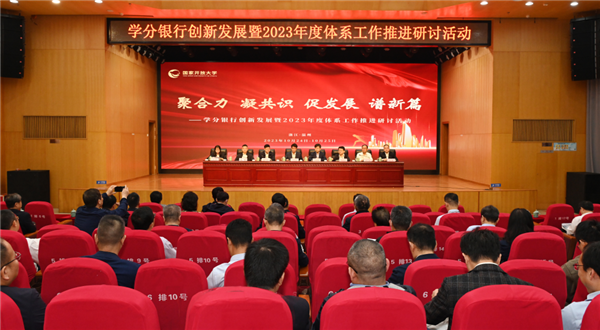 The Open University of China (OUC) recently hosted a seminar in Wenzhou City, Zhejiang Province, from 24 to 25 October.
The Open University of China (OUC) recently hosted a seminar in Wenzhou City, Zhejiang Province, from 24 to 25 October.
This event was organised to support the evolution of a learning society and to further China's vision of becoming a premier country in education. The seminar focused on the innovative development of the Credit Bank and the strategic plans for 2023.

Distinguished attendees included Wang Qiming, the Party Committee secretary and president of the OUC; Dong Zhenhua, the director of the Section of Higher Continuing Education at the Ministry of Education's Department of Vocational and Adult Education; Chen Li, former vice president of Beijing Normal University; Zhang Jianguo, Party Committee secretary of Zhejiang Open University; Chen Yingxu, the deputy mayor of Wenzhou City People’s Government; and Wu Ting, Party Committee secretary of Wenzhou OU.
Moreover, officials from various departments of the OUC headquarters, leaders from 44 branch institutions, representatives from select vocational colleges, industry and enterprise leaders, as well as staff from the credit bank service system were present.
The event was capably overseen by Wang Ran, the executive vice director of the OUC Credit Bank Management Office (Learning Outcomes Accreditation Centre).
Wang Qiming emphasized the significance of the credit bank's advancement from three perspectives: international consensus, national strategy, and the achievements of the OUC. He highlighted the necessity to define the main direction of the credit bank in line with the national strategy, harnessing the strength of the system to further the creation of a learning society. Wang Qiming noted that developing the credit bank is a comprehensive project. It not only calls for the unified efforts of the OUC system but also robust coordination with various departments to propel its growth. Setting standards early, concentrating on tangible guidance, and converting the results of reforms through pilot programs are crucial. Wang Qiming suggested integrating the credit bank's evolution into the "top management commitment" efforts of the OUC's transformation and growth. This would set clear developmental pathways and foster a united momentum for systemic progression. The goal is to enable practical execution through theoretical research and to continually venture into new areas and opportunities.
Chen Yingxu, representing the Wenzhou City People's Government, and Wu Ting, on behalf of Wenzhou OU, each delivered welcoming remarks.
Dong Zhenhua emphasized the critical role of the credit bank in fostering a high-quality education system and building a learning society. In recent years, the OUC has achieved remarkable milestones. This includes refining the credit bank system's design, advancing the construction of the OUC Credit Bank system, initiating the national credit bank for vocational education, and aiding regional and provincial credit banks in their endeavors. He stressed the importance of taking a holistic approach, understanding the broader picture, and pinpointing the essential tasks in creating a learning society. This is pivotal as we embark on the mission of becoming a leading country in education and promoting lifelong learning for all. Dong highlighted four areas of focus for the future. Firstly, amplify the credit bank's function as a bridge linking diverse forms of education. Secondly, strategically and progressively expand the range of credit bank services. Thirdly, drive the use of "gold credits" in various contexts by merging industry and education. Lastly, delve into the potential of new technologies to bolster credit bank operations.
Chen Li has introduced a model for building a lifelong learning service system viewed from five unique perspectives: a novel philosophical approach, interconnected spaces, consolidated social resources, consumption-driven services, and systemic and procedural reforms. This framework provides innovative insights into the role of credit banks in fostering the development of a learning society.
During the meeting, Zhang Jianguo, Secretary of the Zhejiang OU Party Committee; Wang Yuehai, Vice President of Beijing OU; Zheng Hanhua, Secretary of the Anhui OU Party Committee; Liu Wenqing, President of Guangdong OU; Jia Wei, President of Shanghai OU; Yi Huanbin, Secretary of the Liaoning OU Party Committee; and Li Zhengguang, Vice President of Fujian OU, shared updates on the progress and execution of their respective local credit banks. The seminar also featured insights from experts in the postal and petrochemical sectors, representatives from units involved in the pilot projects for the digitalization strategy of credit banks, and specialists familiar with qualification frameworks in the UK and Hong Kong.
Wang Guochuan, Dean of the OUC Reform and Development Department, delivered a keynote speech centered on "Harnessing the Power of the System to Forge a Unified Future for Open Universities." Participants delved deep into group discussions, exchanging insights and experiences from various domains. Key topics included research leadership, pilot initiatives, and pivotal reforms. Central to their discourse was the exploration of how credit banks could capitalize on new opportunities, pushing the boundaries in building a learning society. The overarching goal was to collaboratively devise strategies for forward momentum and growth.
This event has strengthened the unity and common objectives of the open-university system. It has resonated with the spirit of the times, outlined our development pathways, and accelerated the advancement of credit bank construction.
Written by Sun Jingyi from the OUC and photographed by Wenzhou OU